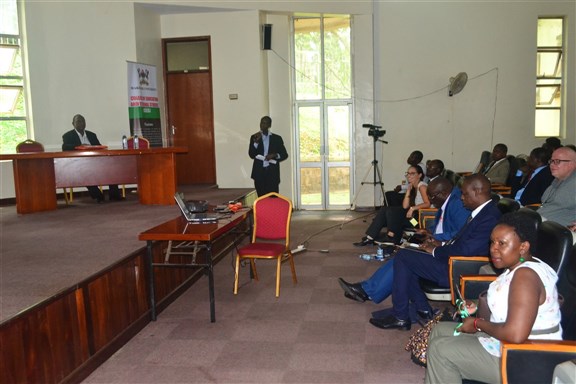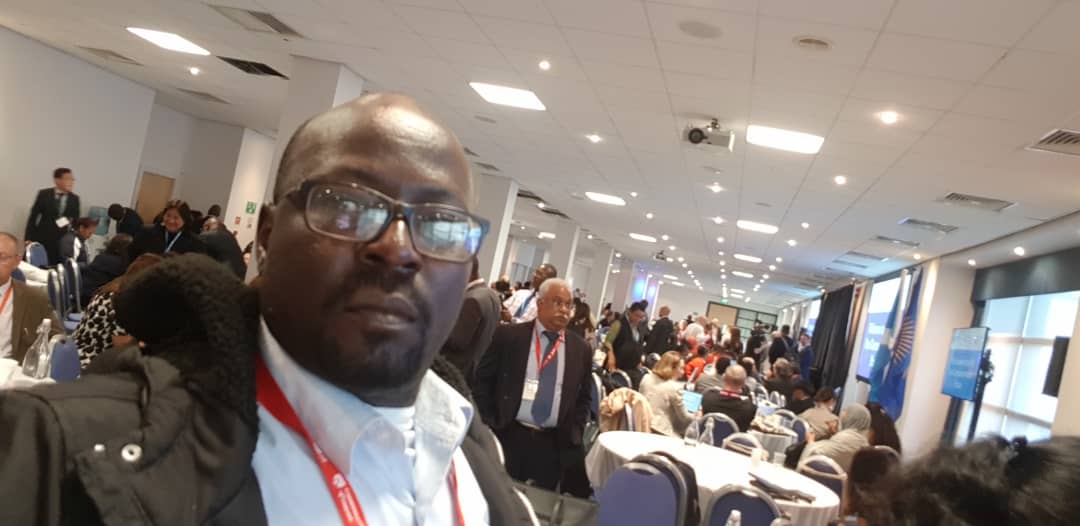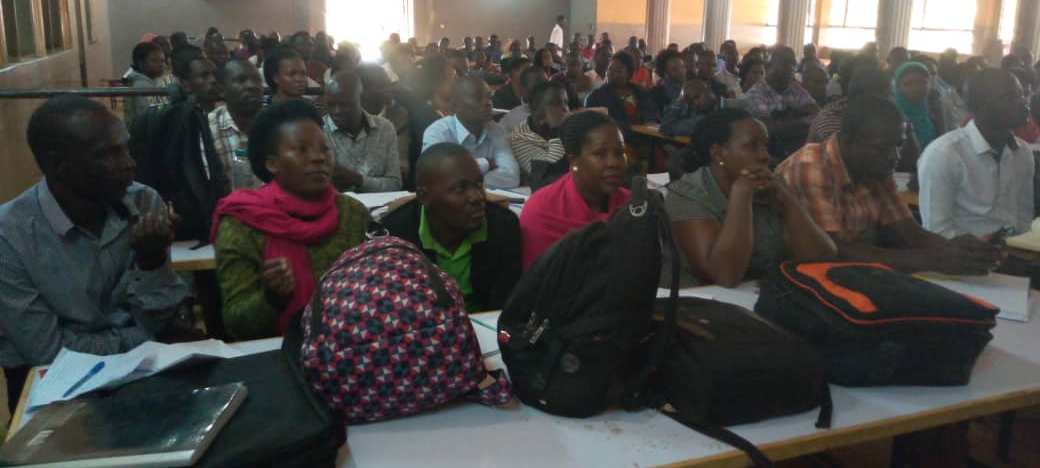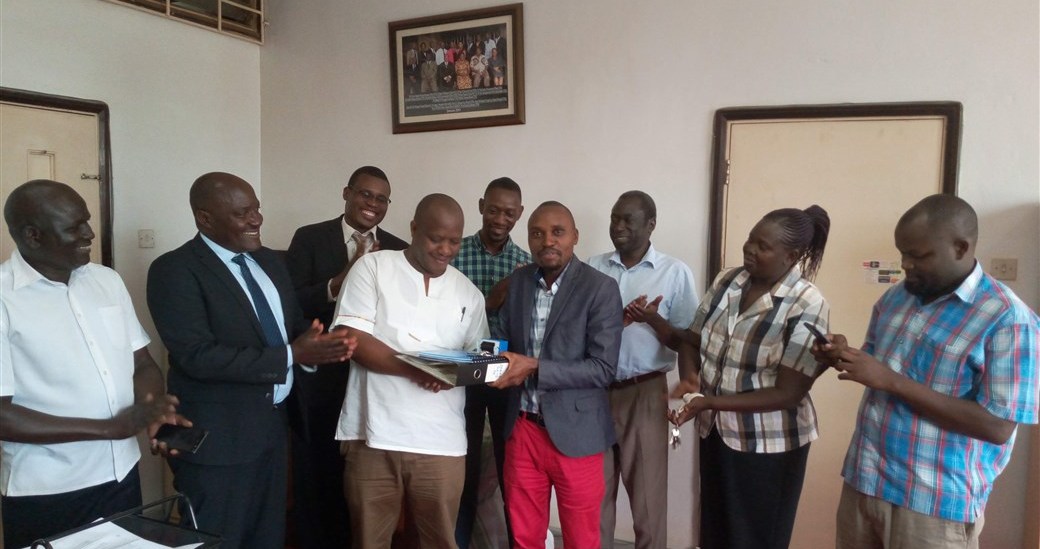Makerere University Chancellor, Prof Banabas Nawangwe delegated Dr Vincent Ssembatya, the Director Quality Assurance Makerere University, on 7th December 2017 to open the International Conference on History Education in Africa that took place at Makerere University, School of Food Technology and Bio- Engineering Conference Hall from 7th and 8th December, 2017 starting at 8:00am.
Dr. Ssembatya Vincent, thanked the Department of Humanities and Language Education, Makerere University, College of Education and External Studies and the African Association for History Education (AHE-Afrika) − based in the Faculty of Education at the University of Pretoria in collaboration with the International Research Association for History and Social Sciences Education who organized the Second International Conference on History Education in Africa, he said that Makerere university as a research led university entertains platforms that brings in different stakeholders to share knowledge and experiences and make recommendations for a comprehensive integrated approach on History Education philosophy
Prof. J.C. Ssekamwa, a renowned professor of History Education, former Dean of School of Education, Makerere University, author of a number of books on History Education, gave an excellent keynote speech about Fashion in education – Historical perspective of skilling Uganda (Education for job creation) at the Second International Conference on History of Education in Africa.
He stressed that “Fashion in history” implies giving different names to one important history theme at different periods. There are three groups of people who give different names to one important history theme. One group is that of people who do this out of ignorance. The second group is that of people who want to show themselves as innovators. The third group of people is that who at the particular time, feel that the history theme in question has reached such a magnitude of concern, and it needs dramatization to make the public focus its attention to it to solve a problem. For example, “skilling Uganda” today, in the face of the rampant unemployment, as far as “Fashion in history” is concerned, the history theme of education being required to impart practical skills, that theme has been given six different terms between the pre-colonial period and the present period in Uganda.
These different terms are; (a) “Production learning”, (b) “Education for adaptation to the environment,” (c) “Comprehensive education’, (d) “Basic Education Integrated into Rural Development or the Namutamba Project Curriculum”, (e) “Basic Education for National Development” (BEND) and (f) “Skilling Uganda”.
The Principal College of Education and External Studies was represented by Deputy Principal, Associate Professor Paul Birevu Muyinda (PhD), who thanked Dr. Dorothy Ssebowa from Department of Humanities and Language Education, School of Education, Makerere University saying that it is through her contact that has made the College of Education and External Studies host the Second International Conference of History Education in Africa
Prof Johan Wassermann & Dr Denise Bentrovato (AHE-Afrika’s directors) in their welcoming remarks thanked the Vice Chancellor of Makerere University, Prof Barnabas Nawangwe, the Principal of the College of Education and External Studies, Prof Fred Masagazi Masaazi, the Makerere organising committee under Dr Dorothy Sebbowa Kyagaba, and the University of Pretoria who have all contributed to making this conference possible on this wonderful campus
Prof Johan Wassermann stressed that AHE-Afrika, based at the University of Pretoria in South Africa, but with members from across Africa, was established because of a need identified for such an organisation in Africa, This need became noticeable when attending History Education conferences in other parts of the world or when reading History Education book publications proclaiming to be “international” in their representation.
However, at these conferences and in the mentioned publications, Africa was generally conspicuously absent. AHE-Afrika, a non-profit organisation which charges no membership fees, aims to try and rectify this by bringing History Educationists from across Africa, and from other parts of the world working in and on Africa, into a pan-Africanist scholarly conversation on aspects related to History Education. One way to do this is by means of a conference organised in a different part of Africa every two years. When possible, we try and underpin the conference held with a publication. The first one in this regard is the forthcoming publication with Sense Publishers entitled Teaching and Learning History in Contemporary Africa: Emergent Research and Debates.
Dr. Dorothy Ssebowa, in her welcoming remark as the International Conference Coordinator, welcomed all the guest in their respective capacities and thanked the Conference organising committee for their commitment and dedicated efforts towards, the Dean School of Education and Principal College of Education and External Studies for the guidance and financial support extended towards the conference. She also stressed that the conference theme was on “Teaching and learning history in a changing Africa: possibilities and challenges in the 21st century” We need to make the content and pedagogy of History relevant to our contextual needs in Uganda and Africa.
Dr. Anthony Mugagga Muwagga, an Associate Professor of Philosophy in the School of Education and Current Ag. Director, Institute of Education Research was the master of ceremony of this academic event and stressed that the pride of a teacher is to see his product excel, he was proud of Dr. Dorothy Ssebowa from the School of Education who is his former student. He was happy to see his student grow higher academically and for organizing a very successful international conference
Another keynote Speech was given by Dr. Jean Leonard Buhigiro from the University Of KwaZulu-Natal & University of Rwanda. His speech was on “Understanding the complexity of teaching the Genocide against the Tutsi through a career life story”. His speech was explaining how career life stories provide opportunities to present teachers’ experiences of teaching the Genocide and its related controversial issues and various challenges faced when teaching controversial issues and strategies to overcome these problems.





